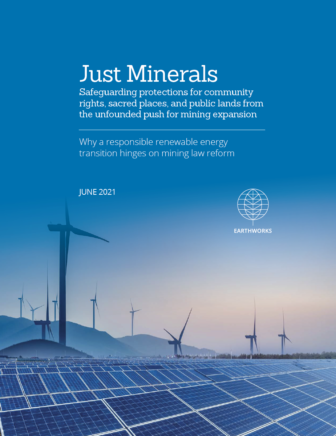Media Contact:
Brendan McLaughlin, bmclaughlin@earthworksaction.org, (206) 892-8832

Today Earthworks published a new report outlining how current federal minerals policy conflicts with the Biden administration’s clean energy and environmental justice agendas, and how those policies must change to ensure minerals are sourced in a way that better protects marginalized communities and the environment. The report, Just Minerals, encourages government officials to prioritize recycling, reusing and substituting minerals needed for renewable energy technology over new extraction.
“Mining has harmful climate, equity and resource impacts that, without reform, may ultimately undermine the benefits of transitioning to renewable energy,” said Aaron Mintzes, Earthworks’ senior policy counsel. “Building a sustainable economy based on clean energy gives us an historic opportunity to confront the legacy of injustice to Indigenous communities and damage to the public lands held in trust for future generations. The Biden administration should embrace this opportunity and update outdated mining laws and regulations.”
The infrastructure to support the transition to low-carbon energy requires a variety of minerals (cobalt, lithium and nickel, among others). According to the financial firm MSCI, the vast majority of proposed lithium (79%), copper (67%), nickel (95%) and cobalt (68%) mining sites in the United States are within 35 miles of Native American lands and reservations.
Among Just Minerals’ key findings:
- Updating the rules that govern mining on public lands must be an integral part of this administrations’ environmental justice agenda until Congress acts to reform the antiquated 1872 Mining Law. Even without Congressional action, the Biden administration has a variety of policy tools available to reduce the pressure to source minerals from irresponsible mines.
- There is significant untapped mineral recycling and reuse potential available using current technology. With the right policies in place, we can create a more circular economy that may approximately halve global demand for minerals key to the clean energy transition.
- Major consumers, including automakers and electronics companies, have directed their suppliers to source more responsibly. Ford, Microsoft, BMW, and Daimler-Benz, among others, have committed to the Initiative for Responsible Mining Assurance (IRMA), which independently audits and certifies environmental and social performance at mines.
Just Minerals details how current policy reflects the sensibilities and values of a bygone, settler-colonial era, and is in dire need of reform—yet decades of mining industry opposition has stymied reform efforts. The General Mining Law of 1872 still governs hardrock mining on public lands, prioritizing mining over all other land uses. Unlike other extractive industries, hardrock miners pay no royalty on the wealth extracted from public lands—$300 billion and counting since 1872—without giving taxpayers a dime for them. Hardrock mining is also the nation’s top toxic polluter, with 40% of western states’ headwaters polluted from mining. Communities across the country are living with pollution from mining, and taxpayers—not the polluters—are often paying for a cleanup bill which has reached $50 billion.
“We cannot allow the mining industry to trample indigenous rights, sacred lands and biological diversity,” Mintzes said. “In order to be truly clean, just and sustainable, the renewable energy transition must be built on responsibly sourced minerals.”
The full report can be found here.
For More Information:
- Reducing new mining for electric vehicle battery metals
- Recharge Responsibly
- Revising Hardrock Mining Regulations
